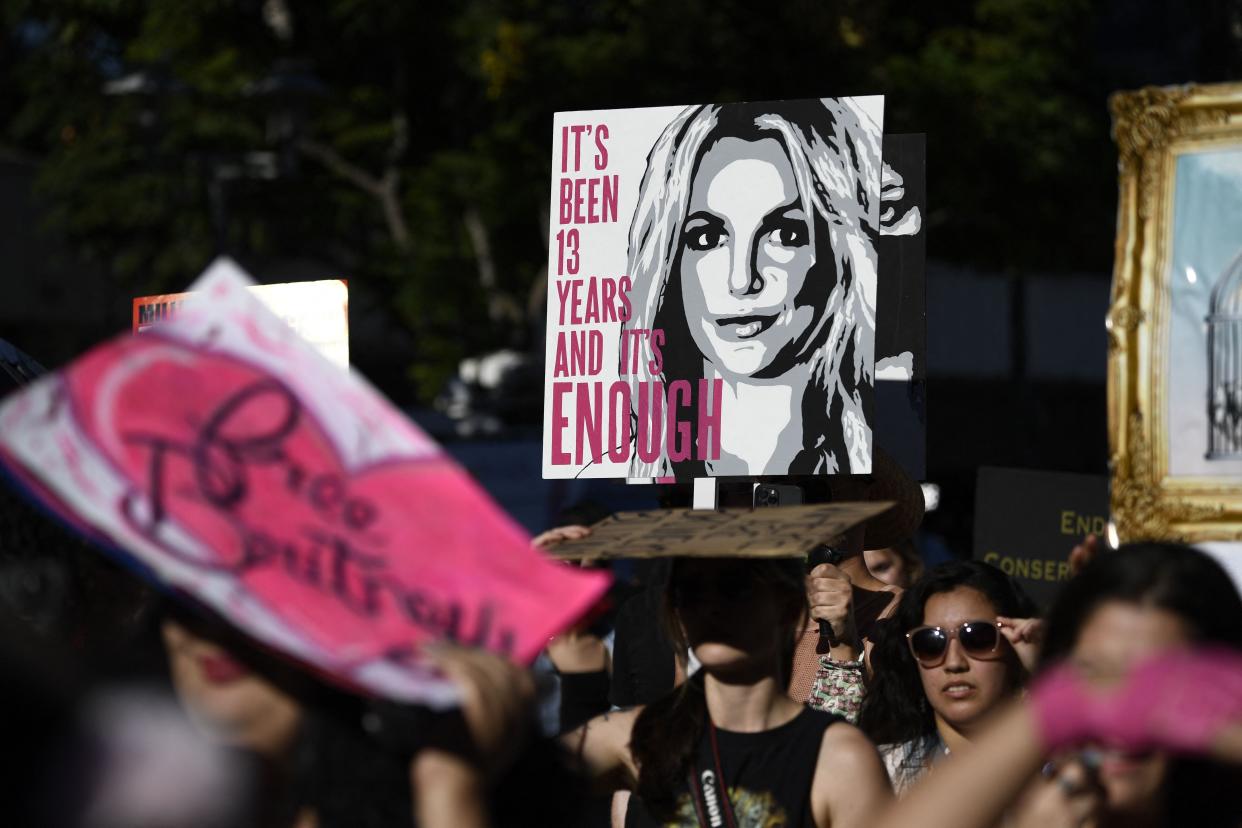After Britney Spears' abusive conservatorship, don't reform the system – abolish it

- Oops!Something went wrong.Please try again later.
Britney Spears’ nearly 14-year-long conservatorship ended Friday. But this isn't the end of the shady world of probate courts. I’m intimately aware of this system myself, having been conserved for nine years in the New Haven Probate Court under a report from a doctor. I couldn’t choose where I lived, consent to medical treatment, spend the little money I had, or seek employment to add to it.
It’s a system that devours people’s dignity and wealth and it doesn’t look like it will change anytime soon, despite the new scrutiny.
Forget taxing the rich; conservatorships are the new wealth redistribution. Approximately $273 billion of American wealth is under control of guardians right now.
According to Linda Kincaid, co-founder of the Coalition for Elder and Dependent Adults Rights (CEDAR) a high risk factor for being involuntarily conserved – in addition to being embroiled in family infighting – is an estate larger than $500,000.
Guardianship or theft?
It’s overly sanguine to suggest that most of these conservatorships are about anything other than money.
When 88-year-old Harold Scull fell at his home and authorities wrongly suspected his partner of 25 years of pushing him, conserving his person – meaning securing control over his non-financial decisions to prevent him from residing with an erstwhile abuser –would have been the most sensible, if overblown, response. Instead, Sonoma County officials targeted his estate, his property, to sell it. Allegedly, some county employees were overheard commenting that Scull’s property would “look great” in their living room.
The way conservators siphon wealth away from its rightful owners borders on the comical. One Orange County, California, conservator made a trip to a post office for a client then, oops, she did it again, 18 more times to total 19 post office visits in just one day.
And a judge approved the fees for that.
Linda Kincaid and her co-founder, Richard Calhoun, found 43 separate occasions between Jan. 1, 2016 and December 31, 2017, where the conservator billed for working more than 24 hours in a day. Probate judges are given such latitude and discretion that these so called “equity” courts become lawless environments.

The drain on Spears’ estate won’t stop now that she's sprung by Los Angeles Superior Court Judge Brenda Penny. According to Rick Black, co-founder of Center for Estate Administration Reform, battles will likely last for years if Spears seeks to hold any attorneys accountable for being unjustly enriched. As they defend themselves, they can bill those legal costs to Spears’ estate. Hit her, baby. One more time.
Two bipartisan federal bills aiming to reform this system, The Guardianship Accountability Act and the FREE Act, are pending. As currently written, though, neither of these bills will minimize this system of interpersonal tyranny; in fact, they may immortalize it.
Adam Crepelle: Conservatorships trampled Indigenous rights long before Britney Spears spotlight problem
Because there’s no routine data collection on the age, race, or gender of the people whose $273 billion is out of their control, the Guardianship Accountability Act would systematize this data. These numbers are likely necessary to understand conservatorship trends, but would also provide a roadmap of better avenues to exploitation.
The FREE Act doesn’t have an accountability plank and seeks to turn these tiny equity courts into an arm of big government. The FREE Act sees the private status of many conservators and their potential financial conflicts of interests – because their fees are paid by wards’ estates – as the biggest threat in conservatorships.
Public vs. private guardianship
If passed as currently written, the FREE Act would essentially federalize conservatorships by funneling $260 million to states for new public guardians and caseworkers who would monitor these relationships for fraud and neglect. The only way this bill protects due process rights is if a ward wants to switch out a private conservator they can get a state-funded one.
But public guardians are not necessarily better. The guardian who sold a Tennessee woman’s home out from under her was publicly appointed and paid, as was Scull’s guardian. And Kincaid’s own mother was conserved by the San Bernardino County public guardian.
It’s not the public or private nature of these legal connections that is the core problem; it’s the conservatorship itself.
Leslie Salzman and Rebekah Diller: Britney Spears' new lawyer must reverse her 'civil death.' She's been robbed of who she is.
It’s true that some people need assistance, but a system whereby one private citizen becomes indentured to another one isn’t the way to help the vulnerable. A viable alternative is shared or supported decisionmaking, a system embraced in 13 states and the District of Columbia, whereby a person retains all rights and simply gets support in making choices.
Calls for oversight over conservatorships aren’t wrong, but they are redundant. A system of supervision exists over them right now: namely, the probate judges who create these legal relationships in the first place. Probate should be parsimonious and impose the least restrictive conditions to achieve a stated goal.
But my and Spears’ experiences are proof that this system has little regard for liberty. And no one in Congress has proposed a way to limit these intrusions. The only way to reform the conservatorship system is to starve it. No federal funding. No human fodder.
Chandra Bozelko is a columnist. Her blog won the People’s Voice Webby Award in 2018 and 2019 for Personal Blog/Website.
You can read diverse opinions from our Board of Contributors and other writers on the Opinion front page, on Twitter @usatodayopinion and in our daily Opinion newsletter. To respond to a column, submit a comment to letters@usatoday.com.
This article originally appeared on USA TODAY: Conservatorships like Britney Spears' full of abuse. Abolish them.

